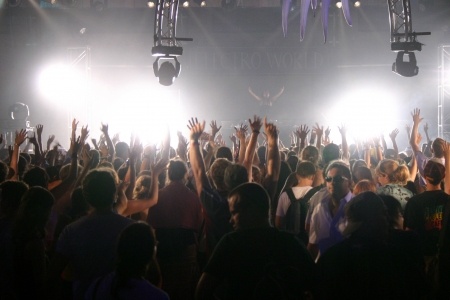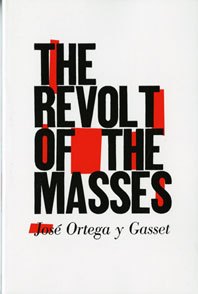
The Revolt of the Masses
PART II: “Mass Man” and Kinetics
 Following Part I, my review and reflections of Jose Ortega‘s seminal book “La Rebelión de las Masas” (tr. The Revolt of the Masses).
Following Part I, my review and reflections of Jose Ortega‘s seminal book “La Rebelión de las Masas” (tr. The Revolt of the Masses).
Masses was written as a reaction to the rise of the fascistic and nationalistic tyrannies of pre-WWII; during the naïve interval between World Wars where some historians claim that the most tender of our years languished. Ten years short of a century later, Ortega’s words hold purchase on perhaps the tenderest of years; the rise of the digital age where social media overtook face-to-face talking as the primary means of communication. If prophesy expresses itself when history is about to repeat, then we might be in for a world of hurt.
Let’s take inventory of a few things we may agree: Ortega delivers what many take as an elitist view of ‘masses’ as having great potential danger due to its general ignorance of finer aspects of society. Yet, he categorically slams fascism as the tyranny of the bourgeois – a thuggish and violent pretense to history and heritage – and admits that such tyranny is also found among socialists and communists. Therefore, Mass Man is as pervasive as his race.
A little less elitist, Ortega postulates that Mass Man is an equal opportunity destroyer: both parent and preserver of the illusion of purity. I found this quote from an anonymous Amazon reviewer that puts a bull’s eye on a key aspect of Ortega’s Mass Man dynamic:
Mass man is a principal character of the modern superstate; an inert, unthinking being hostile to the finer creations of aristocratic culture and easy prey for demagogues of every political persuasion. He is characterized by passivity, an appetite for entertainment and spectacles, and a hostility toward the sensitivity, discipline and training that are necessary prerequisites to aristocratic culture.
What strikes me is the way Ortega defines the ignorance and profound ineptitude of Mass Man. A film quote from Men in Black comes to mind:
A person is smart. People are dumb, panicky dangerous animals…
As Ortega describes it, this dangerous animal is in constant struggle to come to terms with the next “modern world” and blinded by non-stop bewilderment of never ending levels of socio-economic complexity. We are most certainly aware of this struggle, and instinctively we know how dangerous Mass Man truly is. And we appease this creature in tides of de-constructionism, de-historicizing, de-genderizing, de-humanizing – we call it “political correctness” for short. It is one of the greatest social re-engineering projects ever undertaken. To quiet mass man, to ease his pain, we are willing to strangle every shred of uniqueness from our culture. We fear what he can do so much that we will straighten all paths and clear all stumble stones so that he never stubs his toe. Then all hell breaks loose when he does.
If you are uncomfortable with that interpretation, consider Ortega’s blunt description of the psychological and sociological constructs; how the social transitions from extremes of public order to disorder projects latent impetus that Mass Man has for extremist politics. Yeah. Just like that. Were Ortega here with us now, he might write about the new uncertain age – one that could unify our energies toward something transformational (like world peace) or set us blundering into yet another epoch of tragic waste – like a civil war, perhaps?
That leads me to what I believe is Ortega’s most chilling vision: Mass Man as a kinetic object manipulated by politicians and other de facto ‘rulers’ (think “corporations” and “special interests”). Here is where the ontological question of “plentitude” enters the discussion. Ortega categorizes plentitude in several ways: in terms of technology, humanity, moral sense, reality and of practical aspects of daily life like water, energy, well-stocked grocery stores, and so forth. Now imagine a decline of plentitude – either artificial or real – and the struggles that will follow.
We witnessed the power of those kinetics in the so-called Arab Spring; how, after years being denied various forms of plentitude, Mass Man rose up and swept aside the former rulers of Egypt, Yemen, Libya (and soon to be Syria). In some cases (Kaddafi’s Libya), I believe the kinetics were triggered accidentally by pure blundering. In other cases (Mubarak’s Egypt), there is evidence of deliberate manipulation. There are governments – the autocratic ones in particular – that are in clear danger. China, for one, may have the kinetics and the plentitude factors in place to make a spectacular fall. During the Trump years, even the United States and the European Union fall victim to the same.
Among many readers of Ortega is the fatalistic agreement that the fall of western civilization has been foretold in this book. I have a few problems with that idea – especially when it’s told to me as a matter of certainty. Nobody has the power to peer through the thick fog of time and circumstance – which, by the way, grows thicker with every passing day. Who can say that any dynamic of human behavior will predict our future with any kind of accuracy? Ortega is a great philosopher from his time – but he is not a futurist, not a soothsayer or a prophet. His visions are based on philosophical observation, not empirical evidence. Moreover, these essays were written as warnings to the aristocracies of the day, not modern democracies. People who use Masses to extrapolate prophesy go far beyond historical and practical application. That he foretells the fall of all governments, is a rush to judgment and a pessimistic stretch of what seems more like irrational run for the door. The reports of the death of all civilization is a greatly exaggerated hyperbole – with a touch of social media click bait to boot.
I prefer to view this book as warnings for today’s governments – present and future, democratic and autocratic – to be cautious of the path forward. We cannot escape his warnings about profound change. And most certainly we are enduring some tough times. But American and European societies are not so fragile as to tumble into a Mass Man situation that easily. We may tease the kinetics a bit, but most countries tend to give Mass Man plenty of room to blow off his frustrations. Social media presents some problems of its own, and from time to time, we may witness “mass man” riot or burn down a neighborhood or two; however, are these separate acts rage the opening measures of rebellion? If the latter were the case, then rebellions would be far far more frequent.
Ortega gifts us with a perspective of our human condition based on some pretty subjective observations that arguably are fairly post-WWI Euro-centric. I chose to use his observations to gain a clearer vision of how I fit into this whole mess – after all, Mass Man exists wherever we live, but WE have control. -HP
About: Ray Wyman, Jr is a content creator, communications professional, and author with more than 30 years of experience. Visit LinkedIN or Raywyman.com for more information.


